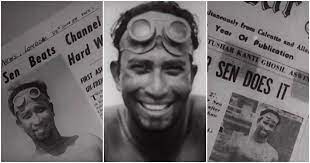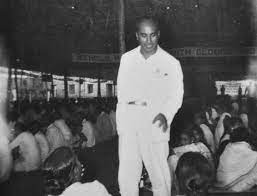
Remembering an icon #KSHegde on his Jayanti.
He established now world renowned #NITTE.
Bishan Tandon's book on events leading to imposition of Emergency, PMO Diary, said that Indira Gandhi was "terribly afraid" of this person becoming the CJI.
He resigned as Supreme Court Judge

He established now world renowned #NITTE.
Bishan Tandon's book on events leading to imposition of Emergency, PMO Diary, said that Indira Gandhi was "terribly afraid" of this person becoming the CJI.
He resigned as Supreme Court Judge


as a matter of principle when one of his junior colleagues superseded him for the post of CJI.
He would have made to the Rashtrapati Bhavan, but Neelam Sanjeev Reddy got the coveted post.
On the Jayanti of #KSHegde, a tribute for founder of #NITTE , Ex Speaker of LokSabha,

He would have made to the Rashtrapati Bhavan, but Neelam Sanjeev Reddy got the coveted post.
On the Jayanti of #KSHegde, a tribute for founder of #NITTE , Ex Speaker of LokSabha,


Ex VP of Bharatiya Janata Party (BJP) and Ex RS Member from Congress.
Kawdoor Sadananda Hegde was born on 11 June 1909 at village Kawdoor of Karkala Taluk, Hegde did his primary at Karkala and moved to Mangalore for Higher education.
He completed his degree and law from Madras.
Kawdoor Sadananda Hegde was born on 11 June 1909 at village Kawdoor of Karkala Taluk, Hegde did his primary at Karkala and moved to Mangalore for Higher education.
He completed his degree and law from Madras.
K S Hegde started his practice in 1933 & helped Farming community, while he worked as Government Pleader and Public Prosecutor during the period 1947-51.
Hegde was elected to the Rajya Sabha as a Congress Party nominee in 1952, served till 1957 He was a member of the Panel of
Hegde was elected to the Rajya Sabha as a Congress Party nominee in 1952, served till 1957 He was a member of the Panel of
Chairmen and of the Public Accounts Committee & the Rules Committee.
In 1957, Hegde resigned from the Rajya Sabha when he was appointed a Judge of the Mysore High Court.
In 1966, when he was appointed as the first Chief Justice of the Delhi and Himachal Pradesh High Court.
In 1957, Hegde resigned from the Rajya Sabha when he was appointed a Judge of the Mysore High Court.
In 1966, when he was appointed as the first Chief Justice of the Delhi and Himachal Pradesh High Court.
In 1967, he was appointed by the President as Judge of the Supreme Court.
This section is an important read....
As a judge of the Supreme Court of India, his lordship was also a part of the UNPRECEDENTED 13 Judge Bench (Never Before & Never Again) which decided the famous
This section is an important read....
As a judge of the Supreme Court of India, his lordship was also a part of the UNPRECEDENTED 13 Judge Bench (Never Before & Never Again) which decided the famous

Kesavananda Bharati v. State of Kerala.
It was a sharply divided verdict, by a margin of 7-6, the court held that while the Parliament has "wide" powers, it did not have the power to destroy or emasculate the basic elements or fundamental features of the constitution.
It was a sharply divided verdict, by a margin of 7-6, the court held that while the Parliament has "wide" powers, it did not have the power to destroy or emasculate the basic elements or fundamental features of the constitution.

Justice K S Hegde & J J Mukherjee wrote in the judgement that infuriated Indira Gandhi.
They held that Constitution of India which is essentially a social rather than a political document, is founded on a social philosophy & as such has two main features basic & circumstantial.
They held that Constitution of India which is essentially a social rather than a political document, is founded on a social philosophy & as such has two main features basic & circumstantial.
The basic constituent remained constant, the circumstantial was subject to change and the broad contours of the basic elements and the fundamental features of the Constitution are delineated in the preamble and the Parliament has no power to abolish or emasculate those basic
elements of fundamental features. The building of a welfare State is the ultimate goal of every Government but that does not mean that in order to build a welfare State, human freedoms have to suffer a total destruction. Applying these tests, the learned Judges invalidated
Article 31C even in its un-amended form.
Indira Gandhi did not take kindly to this implied restriction on her by the court. On 26 April 1973, Justice Ajit Nath Ray, who sided with her, was promoted to Chief Justice of India superseding three senior Judges, Shelat, Grover & Hegde
Indira Gandhi did not take kindly to this implied restriction on her by the court. On 26 April 1973, Justice Ajit Nath Ray, who sided with her, was promoted to Chief Justice of India superseding three senior Judges, Shelat, Grover & Hegde
which was unprecedented in Indian legal history. Adv C.K. Daphtary termed the incident as "the blackest day in the history of democracy". Justice Mohammad Hidayatullah (previous Chief Justice of India) remarked that "this was an attempt of not creating 'forward looking judges'
but 'judges looking forward' to the office of Chief Justice.
On 30th April 1973, Justice K S Hegde resigned as the SC Judge. In 1977, he was elected to the 6th Lok Sabha from the Bangalore South constituency on a Janata Party ticket.
(Now represented by #TejasviSurya)
On 30th April 1973, Justice K S Hegde resigned as the SC Judge. In 1977, he was elected to the 6th Lok Sabha from the Bangalore South constituency on a Janata Party ticket.
(Now represented by #TejasviSurya)
On 21 July 1977, the first time LS MP K S Hegde was elected as the Speaker following the resignation of Neelam Sanjiva Reddy to contest the election to the office of the President of India.
Infact L K Advani suggested K S Hegde for the Post of president but Reddy got the nod.
Infact L K Advani suggested K S Hegde for the Post of president but Reddy got the nod.
This Link Below
Advani praises Hegde in blog - Latest Headlines News (indiatoday.in)
Hegde retired from electoral politics after Lok Sabha was dissolved in 1979. He joined BJP when it was founded in 1980 and briefly served as its vice-president.
He then established
Advani praises Hegde in blog - Latest Headlines News (indiatoday.in)
Hegde retired from electoral politics after Lok Sabha was dissolved in 1979. He joined BJP when it was founded in 1980 and briefly served as its vice-president.
He then established
the Nitte Education Trust in 1979 to provide a high school to the village of Nitte and today
it is deemed to be university, thanks to his efforts.
Justice K S Hegde attained Moksha on 24 May 1990 at his residence in Mangalore, and left behind his wife Meenakshi and six children

it is deemed to be university, thanks to his efforts.
Justice K S Hegde attained Moksha on 24 May 1990 at his residence in Mangalore, and left behind his wife Meenakshi and six children


three sons and three daughters, including well known Justice Santosh Hegde and Vinayaka who
runs NITTE.
#ForgottenHeroes
#VandeMataram
runs NITTE.
#ForgottenHeroes
#VandeMataram
• • •
Missing some Tweet in this thread? You can try to
force a refresh










